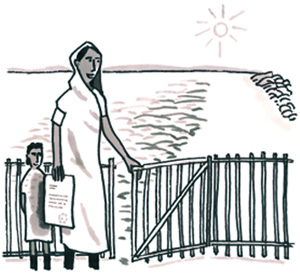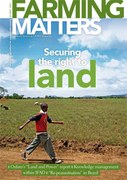For more than forty years, Landesa has been striving to secure land rights for the world’s poorest families. With headquarters in Seattle, Washington, its work is based on the firm belief that having legal rights to land is the first condition for prosperity. “We’ve learned”, explained Landesa’s CEO, Tim Hanstad, “that when a family has land of their own, they have the opportunity and the means to improve nutrition, income and shelter. We’ve seen that when land rights are secure, the cycle of poverty can be broken – for an individual, a family, a village, a community and entire countries.”

cAccording to research conducted by several experts, one billion of the world’s poor share two common traits. Firstly, their subsistence is based on agriculture; secondly, they quite often lack secure rights to the land they cultivate.
As Mr Hanstad points out, “we can consider landlessness as one of the best predictors of extreme poverty around the world”. But there is another important aspect that emerges from analyses of the world’s poor: although women produce more than half of the food consumed in most developing countries, they rarely have any legal claim to the land they till.
Ensuring women’s land rights is a core focus for Landesa. In 2009 it opened the Center for Women’s Land Rights, aiming specifically at “putting the most powerful development tool – land – into the hands of the most promising users – women”.
When women have legal control over their land, Mr Hanstad told us, they can invest in their family’s future and can ensure that their children’s needs are met. “Of course,” he continued, “women’s land rights are a matter of social justice; but they are also critical from an economic perspective”.
Conscious of the importance of adopting approaches that are sensitive to specific local realities, political institutions, history and culture, the centre works together with governmental institutions to develop tailor-made solutions. Because land rights and customary rights are different in each country Landesa’s programmes are different in each country.
Founded in 1967, Landesa was formerly called the Rural Development Institute. It currently leads projects in China, India, Liberia, Uganda, Kenya, Rwanda and has ongoing research activities in a number of other countries.
To find out more about Landesa and its Center for Women’s Land Rights please visit http://www.landesa.org/women-and-land or contact Ms Rena Singer, Landesa’s Senior Communications Manager, at renas@landesa.org.
Landesa devotes much of its efforts to educating and informing policymakers, researchers, and practitioners around the world, with a special view to promoting changes in laws and policies that will protect and strengthen women’s land rights. To this end it has launched the Women’s Land Rights Fellowship Programme, to train and mentor legal professionals.
Next year it will launch the Women’s Land Rights Visiting Professionals Programme, which will bring professionals from the developing world to Seattle to improve their ability to work on women’s land rights issues. Both programmes are run from the organisation’s Seattle office. And both programmes aim to create a network of professionals that work at both national and international levels.
The organisation is also building an E-Library on Women’s Property Rights, aiming to create a worldwide database to support practitioners and advocates in finding the most effective solutions to ensure women’s legal ownership of land.
Text: Nicola Piras

